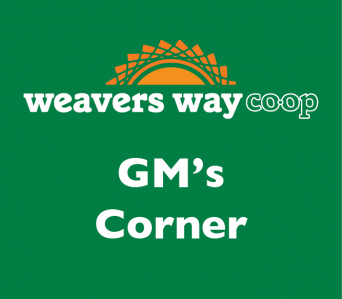
GM's Corner: The Whole Truth About the Competition

We are often compared to Whole Foods. No, really. "Wow, you’re just like a mini Whole Foods," people say, usually in an attempt to be complimentary. It’s like being told you resemble a particularly unpleasant-looking celebrity: "Wow, you look just like Keith Richards." Thanks a lot.
I’ve been hanging out at Whole Foods a lot lately.
Don’t worry, I’m not spending any money. I’m just, you know, hanging out.
My favorite thing to do is walk up next to a well-dressed shopper, pick a random item off the shelf and murmur to myself (loud enough for them to hear) “Hmm, this is a lot cheaper at Weavers Way.”
My other favorite thing to do is ask employees how things are going since they were swallowed by Amazon. That question tends to make them skittish, so they answer with an affected enthusiasm, sort of like East Germans fearful they’re talking to the Stasi. “Amazon? Oh, everything’s great! We’re really happy! No problems here!” Our friends on the inside tell a different story.
I feel completely justified in my little acts of sabotage. You see, in recent months, Amazon’s corporate goons have been spotted in Weavers Way, perusing the produce and taking snapshots of the soup stations.
Worse, they’ve been trying to entice our employees to come over to the dark side. My advice is they shouldn’t waste their time. In my nine years at the Co-op, we’ve helped dozens of Whole Foods staff defect. In that same time, we haven’t had one of ours go the other way.
If all of this seems like I’m paranoid, well, I can be forgiven. The Amazon juggernaut has set its sights on dominating the grocery industry, and it’s prepared to invest seemingly limitless resources in order to do so.
Amazon has concluded that to be in the grocery biz, they’ll need to go beyond their formidable online platform to a more traditional brick-and-mortar model. (Consumers who feel comfortable buying books online still want to smell the melons, squeeze the baguettes and look the fish in the eye before buying.)
Last month, Amazon opened the first Amazon Go, a checkout-less convenience store, in Seattle. It won’t be their last. At this prototype store, customers equipped with their smartphones and armed with the necessary app can walk in, grab what they want and walk out, with the store and app tracking what they’ve purchased. This is either really cool or really creepy.
Closer to home, we’re about a month or so away from Amazon’s latest death star, a brand-new Whole Foods in Spring House, just a few miles from our Ambler store. (The Whole Foods on 309 in North Wales — the last vestige of the old Fresh Fields chain, which was gobbled up by Whole Foods back in the 1990s — will close.)
I’ve been to the construction site of the new Whole Foods a few times (don’t ask how, I ain’t telling). It’s big and I’m sure it will be beautiful. They’ll have a pizza oven and a liquor license and Amazon lockers and they’ll sell Kindles and Echos and whatever future tech gadgets Amazon develops.
We are often compared to Whole Foods. No, really. “Wow, you’re just like a mini Whole Foods,” people say, usually in an attempt to be complimentary. It’s like being told you resemble a particularly unpleasant-looking celebrity: “Wow, you look just like Keith Richards.” Thanks a lot.
The comparison stems from the similar product mix on the grocery shelves. Both Weavers Way and Whole Foods are “natural grocery stores,” so we both sell products like Muir Glen canned tomatoes and Annie’s mac and cheese.
But the similarities are nothing compared to the differences. We have quite a few conventional products on our shelves (Whole Foods hardly has any). Our prepared foods are undeniably superior. And when it comes to supporting local, we’re the pros, they’re the amateurs.
Of course the biggest difference is size. Whole Foods is merely a division of Amazon, with a market capitalization of $569 billion, making it one of the biggest corporations in the world whose CEO and founder, Jeff Bezos, is the richest person in the world, with a personal net worth of $90.6 billion.
Weavers Way is owned cooperatively by 8,800 households, mostly in Northwest Philadelphia and Montgomery County, with a democratically elected board of directors who don’t get paid a dime. We own a few buildings and a couple of trucks.
So no, we’re really not like Whole Foods at all.
Back in the day, Whole Foods was cool, and their employees were unflinchingly devoted to the place. Those days are long gone, as their shareholders’ lust for profit drove them to compromise on their principles and, eventually, right into Amazon’s data-lovin’ maw.
Since the Amazon acquisition, the cost-cutting and philosophy-compromising have only accelerated. At least they’re not ambiguous about their motives: Profit is paramount.
The line their hiring agents give our employees is something like “Hey dude, we’re just like the Co-op.” Except we’re out for global domination.
I wouldn’t count us out. We’ve got a few tricks up our sleeve, and more than anything, we will rely on the resilience of the cooperative business model, of owners locking arms to support their store. That resilience can be fireproof.
And for you Amazon employees, next time you find yourself poking around one of our stores, pick up a job application. Maybe you can become one of the cool kids.
See you around the Co-op.
